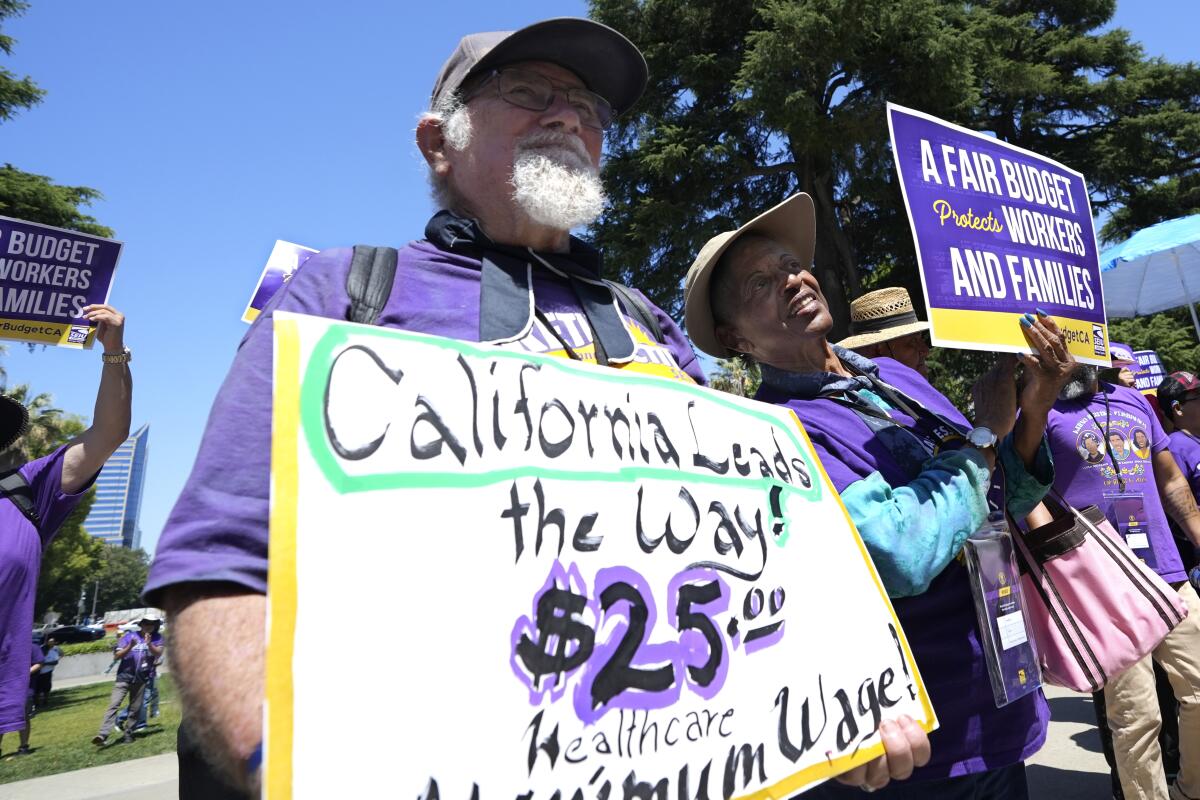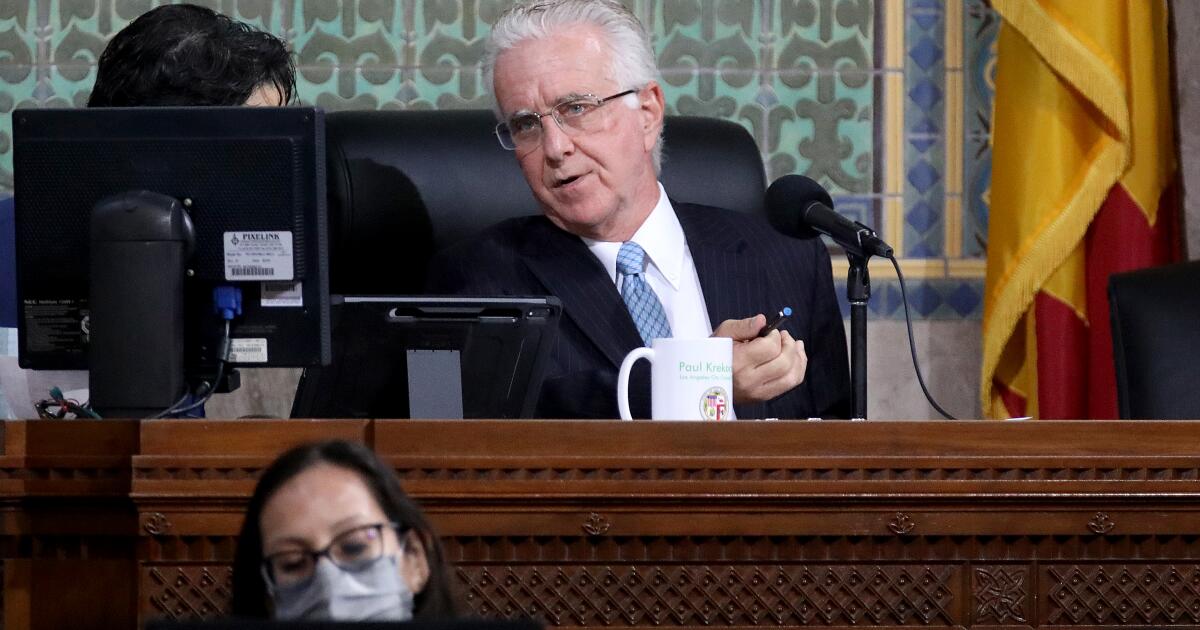with millions of Californians Homeowners are losing insurance as companies withdraw With fuel shortages plaguing the state, political leaders in Sacramento have spent the past two years trying to find a way to solve the crisis.
Yet, even though they have held numerous public hearings and workshops on potential new laws and regulations, another plan is brewing behind closed doors. A select group of Democratic senators recently began discussing insurance issues privately over Zoom — with no public notice of their meetings, no public agenda and no opportunity for anyone other than invited guests and lobbyists to attend.
The arrangement is legal because the California Legislature has exempted itself from the state’s open meetings law that other government agencies must follow. And it’s not uncommon for politically sensitive disagreements at the Capitol to be resolved behind closed doors.
But the amount of secret negotiations going on this month is particularly intense because of two upcoming deadlines. The governor must sign a balanced state budget by June 30, and the deadline to place measures on the November ballot is June 27. This year’s secret budget talks are tied to bargaining around the 2024 ballot.
“Every year there’s some legislation that is enacted that creates a lot of public controversy and results in a lot of activism in and around the Capitol,” said Jonathan Mehta Stein, executive director of California Common Cause.
“Equally important, or more important, decisions are being made through the budget process, and billions of dollars are being distributed with comparatively little public participation, public oversight, and public activism.”
The Legislature passed a tentative budget Thursday that reflects agreements reached between the Senate and Assembly. During the vote, Democrats repeatedly emphasized how open they were in crafting their budget.
“We’ve had 72 public hearings,” Assembly Budget Chairman Jesse Gabriel (D-Encino) said after the vote. “I’ve listened to hours of public comment, as have all the vice-chairmen.”
“I think Californians have a good sense of what the major issues are at stake in this process.”
But the Legislature has yet to finalize a budget. Closed-door meetings with the governor continue as they work to reduce a $45 billion deficit and craft a final funding plan for the fiscal year that begins July 1. Beyond the budget, elected officials are also negotiating with interest groups over proposed statewide ballot measures that include billions of dollars in bonds to build school, housing and environmental projects.
Though California is famous for its citizen-led initiatives, which allow anyone with enough money or political support to collect signatures to put a proposal before voters, a relatively new law gives politicians more power in getting a bill to the ballot. Changes enacted a decade ago Give supporters of the initiative time to back down Their measures have been removed from the ballot. That has set off a flurry of negotiations as Gov. Gavin Newsom and lawmakers try to persuade some interest groups to drop their initiatives in exchange for policy changes from Sacramento.
Some of the major issues being discussed secretly are:
How to take a tough stand on crime:
Lawmakers have spent months crafting a package of bills to combat retail theft and fentanyl addiction. The legislation has gone through multiple public hearings and debates at the Capitol. Meanwhile, district attorneys are collecting signatures for a ballot measure to roll back parts of Proposition 47, a decade-old law that reduced some serious drug and property theft offenses to misdemeanors. Their initiative, which is backed by law enforcement groups and major retailers, is just Qualified to vote last week,
But Newsom and legislative leaders have said so far they don’t want to bring Proposition 47 back before voters. That’s where the behind-the-scenes bargaining comes in.
Representatives of Assembly Speaker Robert Rivas (D-Hollister) put forward a proposal in a closed-door meeting two weeks ago. work done by force Attempting to convince supporters of the ballot measure to withdraw their proposal, they were told that lawmakers were adding a provision to the anti-piracy bill that would nullify the law if the ballot measure passed.
Legislative leaders said the move was necessary to avoid technical conflicts between the ballot measure and the bills. But it did have the effect of opening up negotiations about what supporters would have to do to get their measure off the ballot, or agree on reforms that both sides could accept.
When should health workers be given a salary hike:
Newsom last year signed a law Raising the minimum wage for health care workers to $25 an hour — a plan that lawmakers changed so significantly at the last minute that no cost estimates were available when it was implemented. they passed the billIt turned out to be one of the most expensive new state laws in years, with Newsom’s finance department estimating it would cost 1.5% more in 2015 than in 2014. Cost: $4 billion,
After signing the bill, Newsom told the Times that he had privately reached an “agreement” with lawmakers that the state would have the authority to change the plan in times of financial crisis. But when and how to delay the pay hike? Those details are the subject of secret negotiations that have been going on for months between Newsom’s administration, labor union representatives and other health care interests.
The governor said in May that he wouldn’t sign the budget until the issue was resolved. But he hasn’t said much about how he wants to change the policy, which could affect 400,000 Californians. Democrats who support the legislation have also been silent on it.
“One thing I’ve learned the hard way is to talk too much publicly about a process that’s happening in real time,” Newsom said during his budget presentation in May.
A few weeks later, Newsom dismissed transparency concerns, saying California The law requires the bills to be made public within 72 hours Before MPs can vote on them.
“There’s a lot of public review and a lot of transparency. When you’re governing one of the world’s largest economies, it’s a lot of work, there’s a lot of moving parts,” he said. “We really have the most transparent public processes in the country. In many ways, we’re a model.”

The Service Employees International Union lobbied for a $25 minimum wage for health care workers.
(Rich Pedroncelli/Associated Press)
How much to yield to big business:
Some of the state’s largest companies have teamed up to put two measures on the November ballot that unions and Democrats oppose. One would make it harder for the state to raise taxes, while the other would limit a unique policy. California law that allows workers to sue employers on behalf of other workers.
Rob Lapsley, president of the California Business Roundtable, took part in private meetings last week with Rivas and Senate leader Mike McGuire (D-Healdsburg) to discuss elements of the Taxpayer Protection and Government Accountability Act. The business group is a supporter of the measure, which Lapsley describes as a necessary check and balance on the majority of Democrats who run California government. Removing the initiative from the ballot is a top priority for labor unions, Newsom and Democratic lawmakers.
Lapsley has said he is “very clear” that he will meet with anyone who wants to discuss the measure. So far, it’s unclear whether opponents can provide enough incentive for him to end his campaign, which Democrats have challenged it in the California Supreme Court,
How to pay for the expansion of Medi-Cal:
A dark battle over funding for California’s health care system for the poor is pitting Newsom against some of his top aides.
Anticipating that the state’s budget crisis will continue in the coming years, the governor proposed using revenue from a tax on managed care organizations, known as the MCO tax, to avoid cuts to Medi-Cal.
A coalition led by the California Medical Association and Planned Parenthood called on the governor to stick to an agreement reached in 2023 — and reneged on this year — that would have used some of the money to boost payments to providers that accept Medi-Cal patients.
The group is leading a campaign to A measure on the 2024 ballot This would permanently establish the MCO tax to fund higher reimbursement rates. The coalition argues that increasing rates is critical to improving access to care as the state expands enrollment to immigrants living in the country illegally.
The governor wants the coalition to delay the measure from taking effect or remove it from the ballot altogether. But the coalition, which has struggled to secure a consistent funding source for rate hikes for more than a decade, fears Democrats will again redirect the money if they back down.
Assemblymember Gabriel, who leads the budget committee, said Thursday that it “has been a complicated conversation.”
How much money should voters be asked to borrow:
Last year, MPs had broadly introduced this law A dozen bond offerings totaling $100 billion Many of these issues were publicly debated earlier in the year but were then shelved.
Now, as lawmakers approach a June 27 deadline to place the bond on the November ballot, negotiations have heated up behind closed doors. The debate is centered on how much money to ask voters to borrow and which of three potential bonds to put on the ballot: to help fund school construction, affordable housing and infrastructure. Extreme weather conditions made worse by climate change,
Democrats in the Senate and Assembly have been deliberating during private caucus meetings, which are attended only by lawmakers from the same party. Sources say those talks resulted in Democrats deciding to put bonds on the ballot to fund climate change programs and school facilities rather than housing. But nothing has been announced publicly.
What to do about homeowners insurance woes:
There has been no shortage of public attention to the problem of insurance companies refusing coverage for homes they consider too vulnerable to wildfire. California Lawmakers held hearings The state government is considering making a law to stop the problem. Insurance commissioner has made new rules Newsom is supporting a bill to stabilize the market Speed up the process of reviewing requests Attempts by insurance companies to raise rates.
But McGuire, who is the state Senate leader and comes from the Wine Country region, where many voters have canceled their insurance after a wave of devastating fires, said the changes proposed so far don’t go far enough. That’s why he brought together several Democratic colleagues to form a working group on insurance.
He said he’s hoping to build consensus on how the state can assure homeowners they’ll be protected if they take steps to fireproof their property.
“I’ve been rebuked repeatedly by the industry on this issue,” McGuire said in an interview.
“I would be ashamed if I didn’t use this opportunity to advance legislation we should have enacted years ago that will help stabilize the market and give homeowners the tools they need to make their neighborhoods more safe from fire.”
He said they are trying to craft legislation that can pass by the end of August, but he thinks it could take until next year. He said any bill that comes out of the private working group will have to go through the public scrutiny process of the Legislature.

















